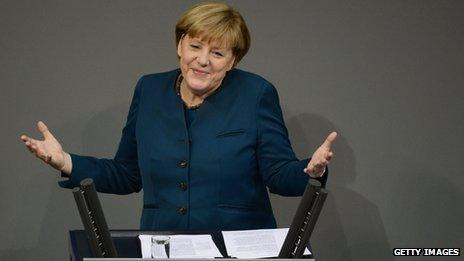A messy banking union
- Published
- comments

As European finance ministers gather today to thrash out the next phase of their so-called banking union, there is a powerful and - some would say tedious - sense of "we've been here before".
Because, as usual, the seemingly intractable dispute needing to be resolved is over the extent to which eurozone governments pool their resources, in this case to help rescue the banks of a member state.
And, as ever, the German government is resisting the urgings of many of the rest to allow the mingled money of member states be deployed as a backstop when national governments and individual banks run out of funds.
You know why the Germans are resistant - they see it as Germany writing a blank cheque to underpin the recklessness and fecklessness of Italian banks and Spanish banks (and never mind that the prudential track record of German banks is hardly spotless).
Bizarrely, perhaps, George Osborne, the British chancellor, will be involved in the talks that are likely to continue into the early hours - although the UK will not participate in any common resolution fund or procedure.
Which shows the messiness of this banking union - whose most important provisions will have to be agreed by some kind of treaty that formalises UK exemption.
That said, some of what's being agreed will apply to the UK.
All member states will have a levy on their banks' assets to fund a pot of money for resolution, or bank rescues.
As it happens, the UK is the only EU member that has such a levy. And apparently it is irrelevant that its £2.9bn a year proceeds are mixed with other tax revenues and are not separated into a special bank-resolution fund.
Or to put it another way, the levy appears to be testament to the good faith of the UK Government that it will finance bank rescues (again), should that be necessary.
But if you are worried that means you - the taxpayer - will be on the hook to bail out insanely risk-taking banks before you can say "here's your Christmas bonus", here's some season comfort.
EU ministers are very close to agreeing rules stipulating that before taxpayers contribute a penny or cent to propping up a bank, the banks' most well-heeled creditors - its bondholders and those with deposits over 100,000 euros - will have to take a hit.
Apparently there is still a bit of skirmishing on this issue, with the Swedes not entirely happy.
But a pact is close. And it would apply in the UK - with the recent rehabilitation of Co-op Bank in Britain an encouraging precedent for how banks can fail and be bailed out by investors, rather than the state.
As for the wider lesson of today's complex and highly charged talks - the eurozone is a long way from being a collective of nations relaxed about making fiscal sacrifices for the common cause of saving monetary union. This means that the gift of a euro at Christmas still can't be seen as a gift that won't one day crumble.